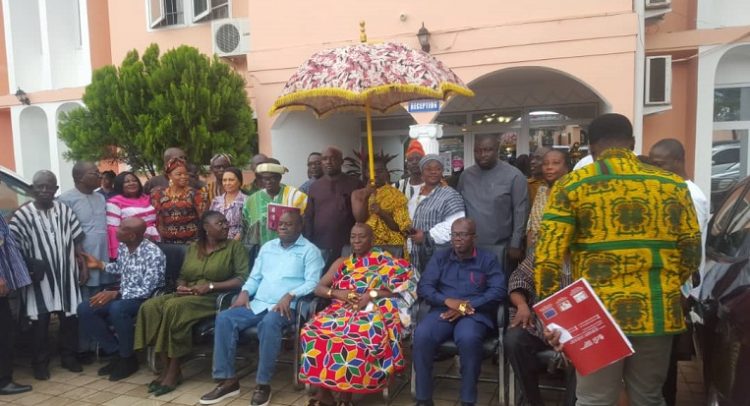The guests in a pose with the host
The Executive Director of the National Commission on Culture (NCC), Nana Otuo Owoahene Acheampong, has expressed worry over the infrastructural challenges currently facing the sector.
The new Executive Director said his major vision is to foster unity towards efficient and effective delivery of the mandate of the Commission and the regional centres.
Delivering a speech at the 2023 mid-year performance review meeting of the commission held in Koforidua, the Eastern Regional Capital, Nana Otuo Acheampong disclosed that the Deputy Executive Director will embark on a working tour to ascertain the real situation of operations at the regions and how to address the peculiar challenges they face.
The theme for the program was, “Towards Effective Operation of the Centres for National Culture, the Role of Partnership and Collaboration”.
Nana Otuo Acheampong also indicated that the Commission will continue to work assiduously, with the help of the ministry to amend the NCC Act 238 of 1990 to help improve its operation adding that before his appointment, the commission was working on amendment of the NCC Act 238 of 1990.
“I am very much ready to work with a strong and vibrant staff that will be determined to play their role in support of the commission. Very soon, we shall be coming out with a comprehensive medium-term development plan which will give us clear direction for at least the next five years,” said Nana Otuo Acheampong.
The Minister for Tourism, Arts, and Culture (MoTAC) Dr. Mohammed Ibrahim Awal on his part said that the government through the ministry has revived the Kwame Nkrumah Mausoleum.
Dr. Mohammed Awal stated that without a good cultural background, there is no tourism.
He promised that the ministry will support the National Commission on Culture to deliver on its mandate.
He affirmed that the government is determined to generate about $6 billion in the Ghanaian economy through tourism from 2025.
The Head of the Eastern Regional Coordinating Council, John Donkor on behalf of the Regional Minister stated that it is paramount to recognize the need to preserve cultural heritage to harness the economic potential for sustainable development.
BY Daniel Bampoe

